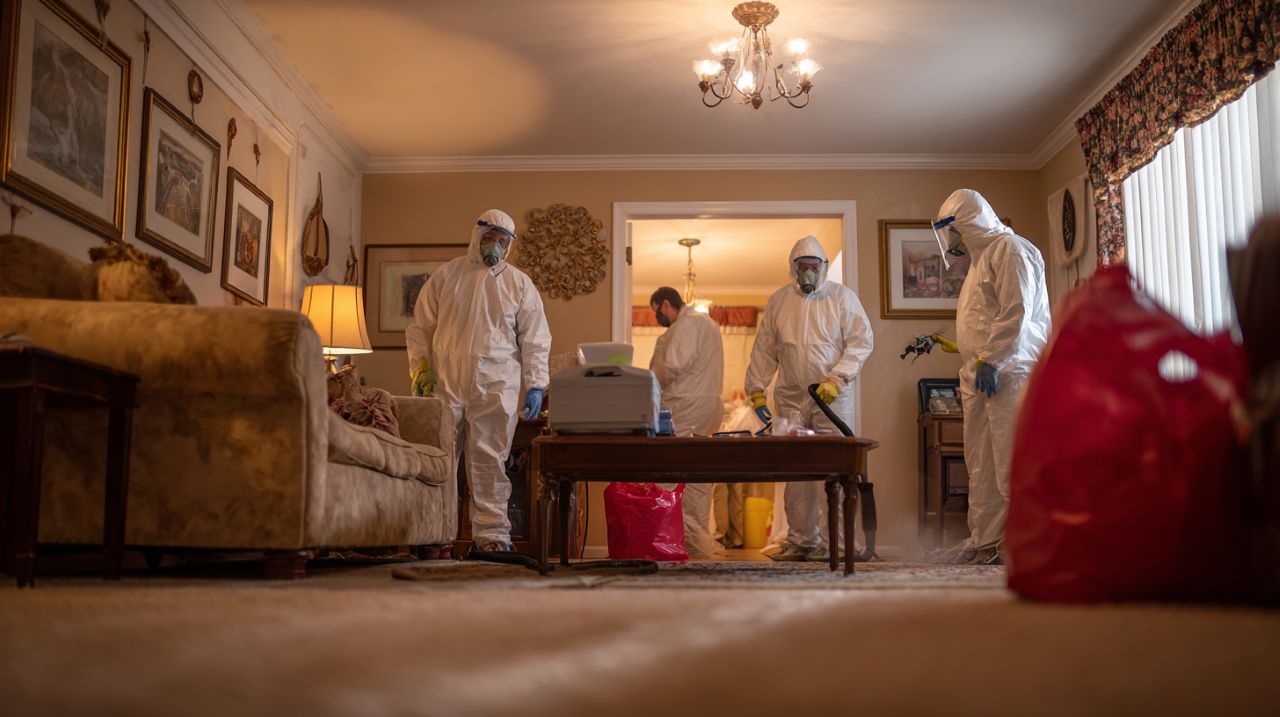
When a suicide happens, the aftermath can be overwhelming in ways most people never imagine. You’re suddenly dealing with shock, grief, and confusion — and at the same time, you face the question of what to do next with the space where it happened.
Many people think they can handle the cleanup themselves. But trying to take on that responsibility can make an already devastating situation even harder.
That’s why it’s important to know that professional suicide cleanup services exist — and why calling experts like T.A.C.T. Franchise is often the safest and most compassionate decision you can make for yourself and others.
1. It’s not just cleaning — it’s handling biohazards safely
A suicide scene isn’t like a regular mess. It often involves blood and other bodily fluids that can carry harmful pathogens such as hepatitis or HIV. These are considered biohazard materials, and they need to be handled and disposed of according to strict health and safety standards.
Professional cleanup teams are trained and certified to follow those standards. They wear protective gear, use medical-grade disinfectants, and follow OSHA and EPA guidelines to make sure no trace of contamination remains.
If you tried to clean a scene on your own, even with gloves and bleach, you wouldn’t have access to the right chemicals, tools, or protective equipment. A small mistake could put your health at risk or leave invisible contamination behind. Professionals make sure that never happens.
2. Cleaning up can take a heavy emotional toll
Even if you’re physically capable of doing it, you shouldn’t have to. The emotional impact of cleaning a loved one’s death site can be lasting and severe. People often underestimate how much trauma can resurface just by being in that space, let alone by handling what’s left behind.
Professional cleaners do this work with compassion and discretion. They understand that what you need most is relief, not reminders. Many companies even train their technicians in trauma awareness, so they know how to approach the job respectfully without adding more emotional burden to your life.
When you bring in professionals, you’re not just paying for cleaning — you’re buying peace of mind and giving yourself space to grieve.
3. Professionals restore safety and dignity to the space
After a suicide, the goal isn’t only to clean up what’s visible. It’s to restore safety, comfort, and dignity to the place where it happened — whether it’s a home, vehicle, or business.
Professional teams know how to remove odors, stains, and contaminants that you might not even notice. They also follow clear procedures to ensure that once they’re done, the area is completely safe to enter again.
That matters for health reasons, of course, but also for emotional closure. Returning to a space that’s been properly restored can help you begin to move forward. It allows the focus to shift from tragedy to healing.
4. Legal and insurance factors can get complicated
Another thing many people don’t realize: in most cases, law enforcement doesn’t handle cleanup. Once investigators finish their work, the scene is released back to the property owner or family. That means it’s your legal responsibility to deal with what’s left.
Most homeowners’ insurance policies cover biohazard cleanup after a suicide, but they require documentation from a licensed cleanup company. Trying to do it yourself could not only be unsafe but also void your insurance coverage.
A professional service handles that paperwork for you. They document the scene, work with your insurance adjuster, and make sure everything is done according to state and local regulations. That takes a huge amount of stress off your plate.
5. Professionals prevent secondary damage and hidden costs
It’s not just about what you can see. Blood and fluids can soak into floors, walls, and even HVAC systems. If not handled properly, that contamination can spread and cause long-term damage or lingering odors.
Professional technicians use special equipment — like ozone machines and ATP meters — to detect and neutralize any remaining biohazard material. They don’t just clean the surface; they make sure the property is fully restored and safe.
Doing it yourself might seem like it saves money at first, but if you miss something, the cost of remediation later can be far higher. In that sense, hiring professionals is often the more practical and cost-effective option.
6. The industry is trained, regulated, and accountable
Trauma and suicide cleanup is not a casual side job — it’s a regulated profession. Companies must meet specific certification requirements and follow occupational safety standards. Many technicians come from medical, military, or emergency response backgrounds, so they bring discipline and care to every situation.
In other words, this isn’t just a cleaning service — it’s an essential public health and emotional recovery service.
7. It helps you and your loved ones begin to heal
Grieving after a suicide is already an incredibly difficult process. You shouldn’t have to carry the physical burden of cleaning up too. By trusting professionals, you allow yourself and your loved ones to focus on what really matters: processing the loss, finding support, and beginning to heal.
You don’t need to relive the event by stepping into that space again. A trained, respectful cleanup team can handle the hard part quietly and efficiently, giving you the chance to focus on care and recovery.
In summary
You don’t have to face everything on your own. Cleaning up after a suicide is more than just a task — it’s a step in restoring safety, dignity, and emotional peace. Professional suicide cleanup services exist because no one should have to do that kind of work in the middle of tragedy.
Hiring experts protects your health, your home, and your heart. It ensures the space is truly clean, safe, and ready for life to continue. And when you’re ready to take that step, make sure you choose a team that treats you and your situation with the compassion and professionalism you deserve.
